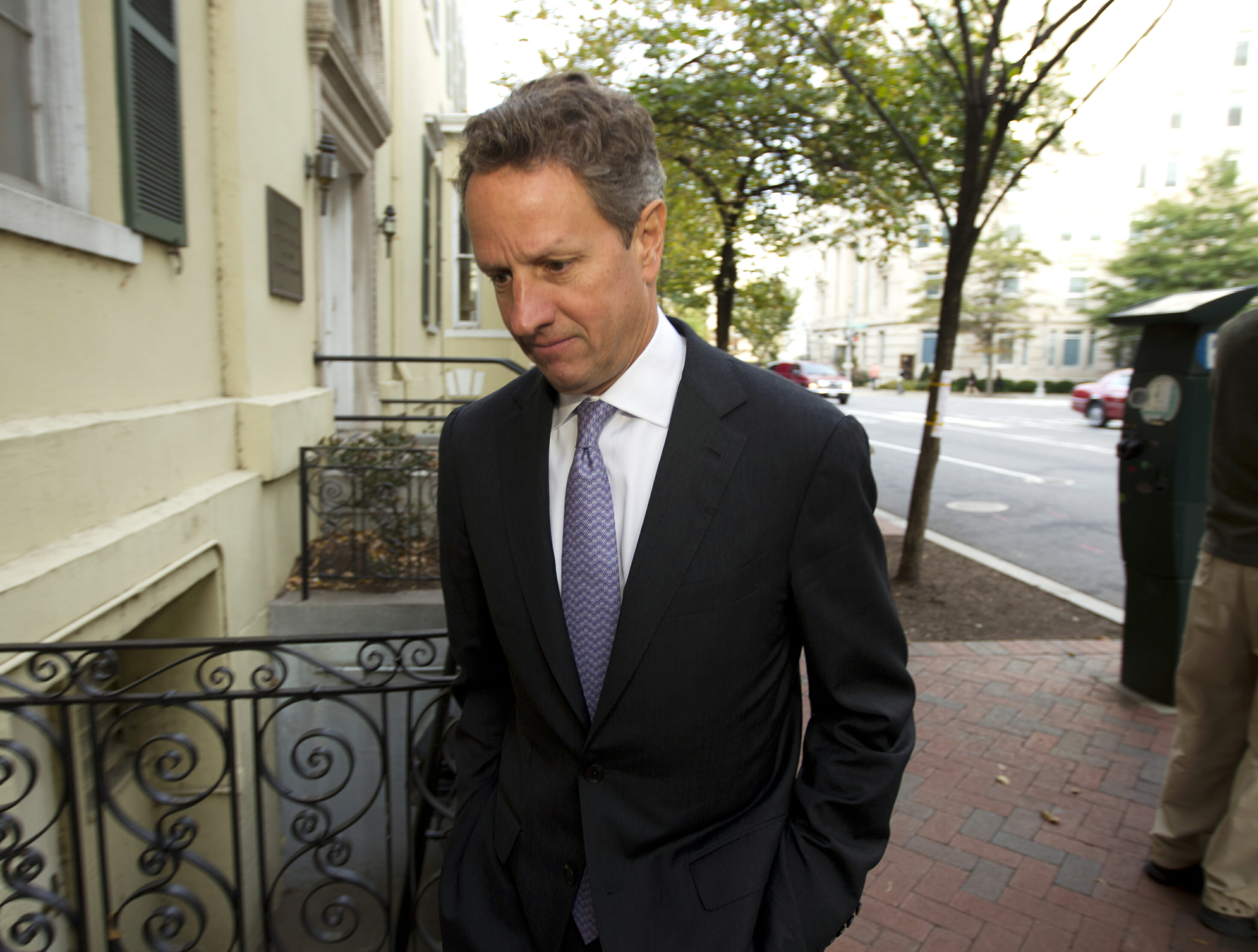When Timothy Geithner Defied Barack Obama
The former treasury secretary's refusal to obey his boss altered the course of the Great Recession—and likely gave us Donald Trump. Former Treasury Secretary Timothy Geithner. (Jose Luis Magana / AP)
Former Treasury Secretary Timothy Geithner. (Jose Luis Magana / AP)
Less than a week after The New York Times ran an op-ed by an anonymous Trump administration official openly challenging the president’s fitness for office, the question of who wrote the piece continues to vex Beltway pundits and the White House alike. But Donald Trump is hardly the first occupant of the Oval Office to face insubordination, potentially from somebody in his inner circle. As The New Republic’s David Dayen reminds us, Timothy Geithner’s “refusal to obey his boss” altered the course of the Great Recession—and likely set us on a path toward Trump’s election.
In March 2009, the U.S. economy was imploding. Citigroup had reported losses in excess of $8 billion the previous quarter, and two government bailouts totaling $45 billion, along with an additional $306 billion in loan guarantees, had proved insufficient to right the ship. While President Barack Obama had publicly dismissed nationalizing the country’s most distressed banks, Larry Summer—then National Economic Council director—was intrigued by the idea, so Obama ordered the Treasury Department to explore a radical restructuring of Citigroup.
“Geithner simply didn’t follow the request,” writes Dayen, citing “Confidence Men” author Ron Suskind. “It was a classic Washington move: When your boss asks for something you don’t like, just ignore it and hope that the request isn’t necessary when the boss follows up.”
Geithner adamantly rejected this account, telling Suskind, “I don’t slow-walk the president on anything.” But as Dayen notes, Obama tacitly admitted that that was what happened, expressing his frustration with “the speed with which the bureaucracy could exercise my decision.”
“The Citibank incident, and others like it, reflected a more pernicious and personal dilemma emerging from inside the administration,” Suskind wrote at the time, “that the young president’s authority was being systematically undermined or hedged by his seasoned advisers.”
The rest is history. Using guarantees and Federal Reserve loans, Geithner helped orchestrate a third bailout for Citigroup, and the bank avoided anything even resembling a downsizing. Today, the former treasury secretary heads a private equity firm that appears to specialize in scamming the poor. From The New Republic:
Any objective look at Geithner’s actions in response to the financial crisis confirms that he would maximize his power on behalf of big banks, even if it meant going around his colleagues and his president. That included paying off AIG’s investment bank counter-parties at 100 percent instead of forcing a discount, or blocking [Sheila] Bair, the FDIC chair, from forcing higher capital rules on banks. Every action fit Geithner’s worldview: The financial system must be stabilized at all costs, as the only way to heal the economy so real people benefit.
Since the Great Recession kicked off 10 years ago this week, upward of $33 trillion in wealth has flowed to the top 10 percent, while the average net worth of the bottom half of the country has dipped from $11,000 to $8,000. A new report released by Public Citizen on Tuesday finds that the country’s five largest banks have raked in more than $580 billion during that time, beneficiaries of a taxpayer-funded bailout, a trillion-dollar tax cut and industrywide deregulation.
Overseeing it all is a far-right demagogue—an established birther and an alleged sexual abuser whose political campaign centered on a pledge to “drain the swamp.”
Happy anniversary.
Read more at The New Republic.
Your support matters…Independent journalism is under threat and overshadowed by heavily funded mainstream media.
You can help level the playing field. Become a member.
Your tax-deductible contribution keeps us digging beneath the headlines to give you thought-provoking, investigative reporting and analysis that unearths what's really happening- without compromise.
Give today to support our courageous, independent journalists.






You need to be a supporter to comment.
There are currently no responses to this article.
Be the first to respond.